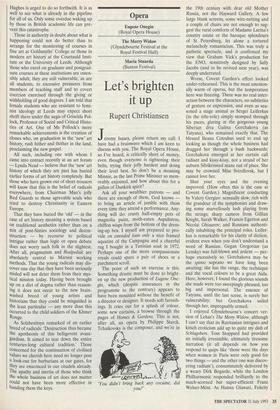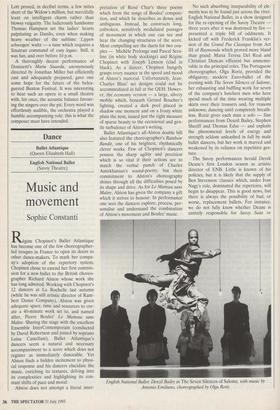Opera
The Merry Widow (Glyndebourne Festival at the Royal Festival Hall) Maria Stuarda (Buxton Festival)
Let's brighten it up
Rupert Christiansen
Jeremy Isaacs, please return my call: I have had a brainwave which I am keen to discuss with you. The Royal Opera House, so I've heard, is critically short of money, even though everyone is tightening their belts, trying their jolly hardest and doing their level best. So don't be a moaning Minnie, as the last Prime Minister so mem- orably enjoined, and how about this for a gallon of Dunkirk spirit? Ask all your wealthier patrons — and there are enough of them, God knows to bring an article of jumble with them every time they attend a performance. Any- thing will do: crusty half-empty pots of magnolia paint, moth-eaten Aspidistras, chiffon wisps from the bottom of the dress- ing-up box. I myself am prepared to pro- vide on extended loan only a nice framed aquatint of the Campagna and a cheerful rug I bought in a Tunisian souk in 1972. Perhaps one of the more compassionate royals could spare a pair of shoes or a parchment scroll. The point of such an exercise is this. Something drastic must be done to bright- en up the new production of Eugene One- gin, which (despite assurances in the programme to the contrary) appears to have been mounted without the benefit of a director or designer. It needs soft furnish- ings. It cries out for a splash of colour, some new curtains, a browse through the pages of Homes & Gardens. This is not, after all, an opera by Philippe Starck. Tchaikovsky is the composer, and we're in `You didn't bring back any cocaine, did you?' the 19th century with dear old Mother Russia, not the Hayward Gallery. A few large blank screens, some wire-netting and a couple of chairs are not enough to sug- gest the rural comforts of Madame Larina's country estate or the baroque splendours of St Petersburg, let alone a tortured melancholy romanticism. This was truly a pathetic spectacle, and it confirmed my view that Graham Vick's production for the ENO, sensitively designed by Sally Jacobs (and to be revived next year), was deeply underrated.
Worse, Covent Garden's effort looked under-rehearsed. This is the most emotion- ally warm of operas, but the temperature here was freezing. There was no real inter- action between the characters, no subtleties of gesture or expression, and even as sea- soned a stage animal as Sergei Leiferkus (in the title-role) simply stomped through his paces, glaring at the gorgeous young Siberian diva Galina Gorchakova (as Tatyana), who remained exactly that. The blessed Ileana Cotrubas used to end up looking as though the whole business had dragged her through a bush backwards; Gorchakova emerged at her curtain call radiant and kissy-kissy, not a strand of her auburn Silvikrinned mane out of place. She may be crowned Miss Sverdlovsk, but I cannot love her.
Shut your eyes and the evening improved. (How often this is the case at Covent Garden.) Magnificent conducting by Valery Gergiev: sensually slow, rich with the grandeur of the symphonies and draw- ing some marvellously lush playing from the strings; sharp cameos from Gillian Knight, Sarah Walker, Francis Egerton and Nicolai Ghiaurov; and Russians authenti- cally inhabiting the principal roles. Leifer- kus is remarkable for his clarity of diction, evident even when you don't understand a word of Russian. Gegan Gregorian (as Lensky) was full-blown and ardent — per- haps excessively so. Gorchakova may be the spinto soprano we have long been awaiting: she has the range, the technique and the vocal colours to be a great Aida. Here, however, I found the glorious sounds she made were too sweepingly phrased, too big and impersonal. The essence of Tatyana, until the last scene, is surely her vulnerability; but Gorchakova sailed through her, impregnably armed.
I enjoyed Glyndebourne's concert ver- sion of Lehar's The Merry Widow, although I can't say that its Ruritanian intrigues and kitsch eroticism add up to quite my dish of Schlagobers. Tom Stoppard had provided an initially irresistible, ultimately tiresome narration (it all depends on how you respond to quips like 'those were the days when women in Paris were only good for two things — and the other one was discov- ering radium'), consummately delivered by a weary Dirk Bogarde, while the London Philharmonic responded brilliantly to the much-scorned but super-efficient Franz Welser-MOst. As Hanna Glawari, Felicity Lott proved, in decibel terms, a few mites short of the Widow's million, but mercifully leant on intelligent charm rather than blowsy vulgarity. The ludicrously handsome Thomas Hampson set the ladies' hearts palpitating as Danilo, even when making heavy weather of the sublime `Lippen schweigen' waltz — a tune which requires a Sinatran command of easy legato. Still, it was fun, and over before 10 p.m.
A thoroughly decent performance of Donizetti's Maria Stuarda, anonymously directed by Jonathan Miller but efficiently cast and adequately prepared, gave one some hope for the future of the belea- guered Buxton Festival. It was interesting to hear such an opera in a small theatre with, for once, the acoustic balance favour- ing the singers over the pit. Every word was effortlessly audible, the orchestra played a humble accompanying role: this is what the composer must have intended.



















































 Previous page
Previous page